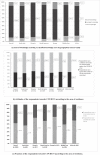Knowledge, Attitude, Practice, and Fear of COVID-19: an Online-Based Cross-cultural Study
- PMID: 34483782
- PMCID: PMC8404540
- DOI: 10.1007/s11469-021-00638-4
Knowledge, Attitude, Practice, and Fear of COVID-19: an Online-Based Cross-cultural Study
Abstract
The study aimed to measure Knowledge, Attitude, and Practice (KAP) and fear level towards COVID-19 and explore its cross-cultural variances in knowledge by sociodemographic factors among the general population of 8 different countries over 5 continents. It was a cross-sectional online survey. This survey was conducted in April 2020 among 1296 participants using the "Google Form" platform. Considering the social distancing formula and pandemic situation, we collect data using popular social media networks. Univariate and bivariate analyses were used to explore the collected data on KAP, fear, and sociodemographic factors. Overall knowledge score was 9.7 ± 1.7 (out of 12), and gender differences (female vs male: 9.8 ± 1.6 vs 9.5 ± 1.9) were significant (p = 0.008) in the bivariate analysis. Knowledge score variances were found significant in some regions by gender, marital status, and education qualification. The highest and lowest mean knowledge scores were recorded in the Middle East (10.0 ± 1.7) and Europe (9.3 ± 2.0). Despite having a high fear score (22.5 ± 5.6 out of 35), 78.35% of respondents were positively and 81.7% in a good practice level. Fear score rankings: Middle East (1st; 23.8 ± 5.5), Europe (2nd; 23.2 ± 5.8), Africa (3rd; 22.7 ± 5.0), South Asia (4th; 22.1 ± 5.7), Oceania (5th; 21.9 ± 5.8), and North America (6th; 21.7 ± 5.5). Fear and knowledge were not correlated. KAP and fear variation exist among geographical regions. Gender, marital status, and education qualification are factors in knowledge variances for some regions. KAP and fear measures can help health education programs consider some sociodemographic factors and regions during an outbreak of highly contagious disease and uplift a positive attitude and good practice.
Supplementary information: The online version contains supplementary material available at 10.1007/s11469-021-00638-4.
Keywords: Attitude; COVID-19; Cross-cultural study; Fear; Knowledge; Online survey; Practice.
© The Author(s), under exclusive licence to Springer Science+Business Media, LLC, part of Springer Nature 2021.
Conflict of interest statement
Competing InterestsThe authors declare no competing interests.
Figures
References
-
- Ajilore K, Atakiti I, Onyenankeya K. College students’ knowledge, attitudes and adherence to public service announcements on Ebola in Nigeria: Suggestions for improving future Ebola prevention education programmes. Health Education Journal. 2017;76(6):648–660. doi: 10.1177/0017896917710969. - DOI
LinkOut - more resources
Full Text Sources
Miscellaneous

